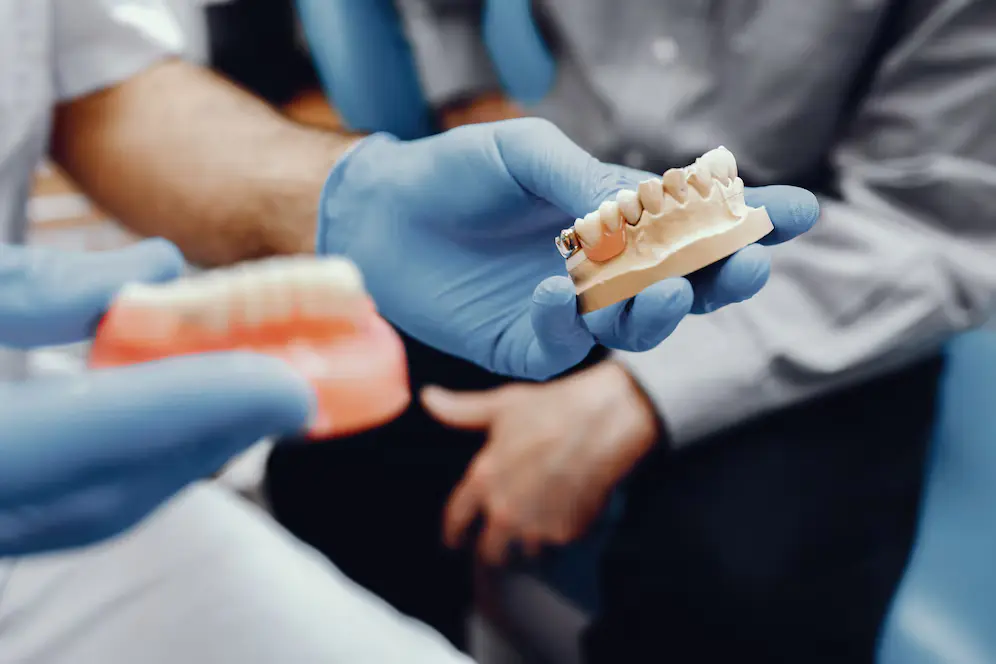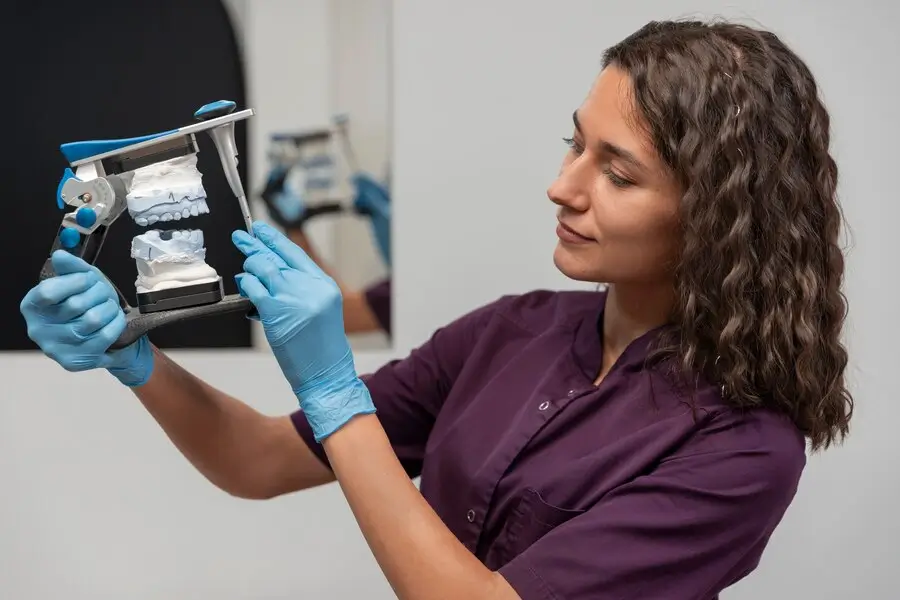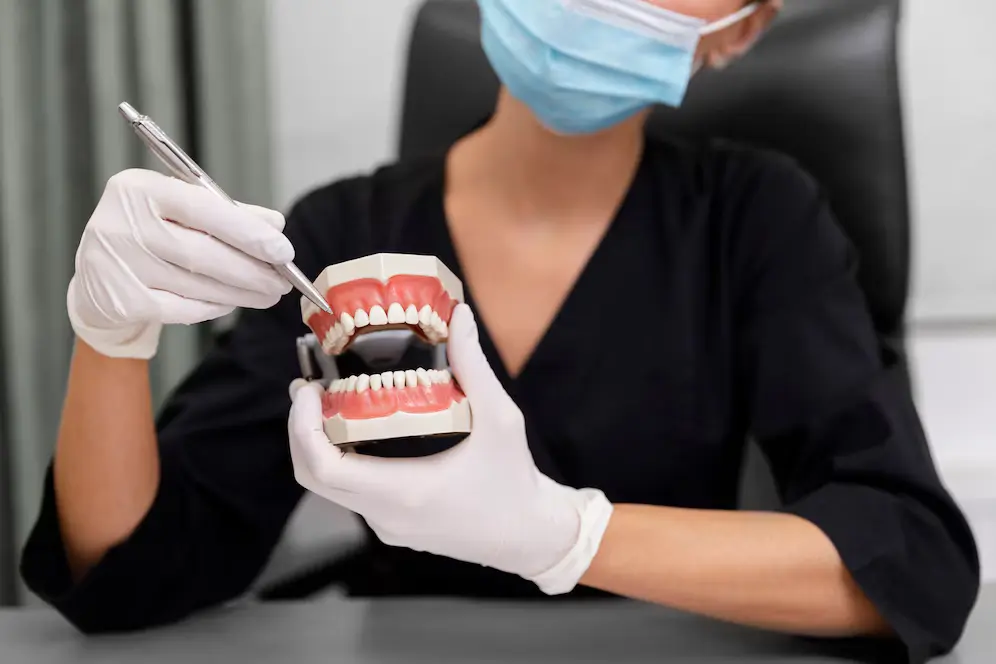What Are Dentures?
Dentures are removable or fixed dental appliances used to replace missing teeth and restore your smile. They can be designed to replace a few teeth or even an entire arch, depending on the needs. Traditional dentures rest on the gums and may use suction or adhesives to stay in place, while permanent options, like implant-supported dentures, are securely anchored to implants in the jawbone. Dentures help people eat and speak clearly, restore facial appearance, and help maintain oral health by supporting jaw structure where teeth are missing.
What Are Dental Implants?
Dental implants are a long-lasting option for replacing missing teeth. They work as artificial tooth roots, usually made of titanium, and are surgically placed into the jawbone. Once healed, the implant supports a crown, bridge, or denture. What makes implants different is that they fuse with the jawbone, offering a stable and secure foundation. This process helps prevent bone loss, supports nearby teeth, and restores full function for chewing and speaking. Implants are also custom-designed to match your natural teeth in both look and feel.
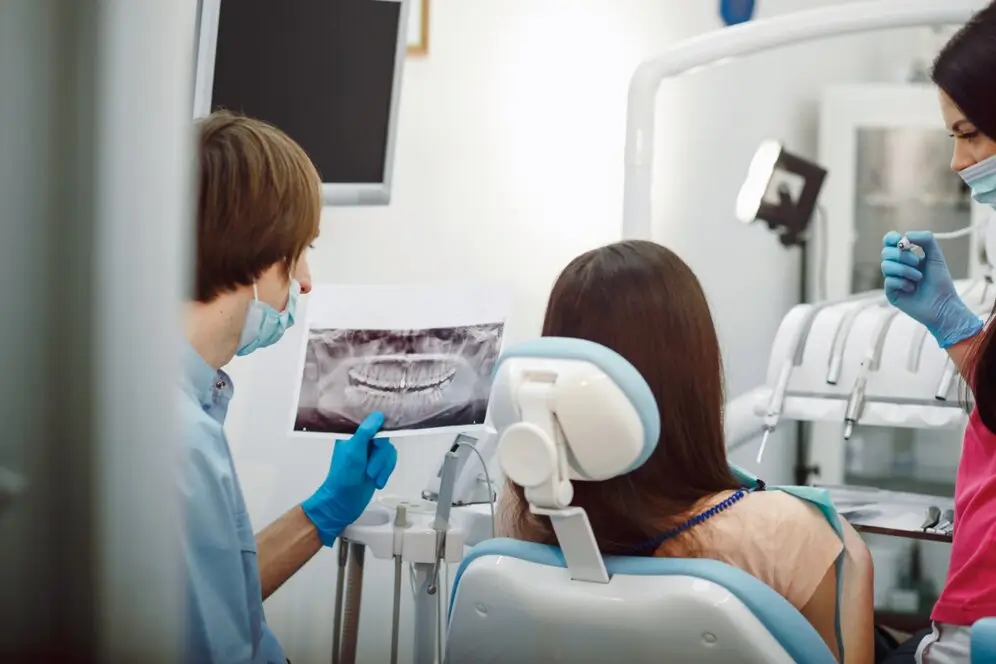
Procedure for Implants vs Dentures
The procedure for getting dental implants or dentures varies based on the condition of your oral health and bone structure. With implants, the process begins by removing any damaged teeth and drilling a small hole into the jawbone. A metal post is then inserted to serve as the root. After the bone fuses around it – a process that can take months – a connector called an abutment is attached. Finally, a crown is placed on top, shaped to match your natural teeth.
Dentures, on the other hand, start with taking impressions of your gums. Whether partial or full, a lab creates a custom-fit set of prosthetic teeth based on your mouth’s structure and bite. After some adjustments, the final set is placed using adhesive to keep it in position.
When considering implants vs dentures, it’s important to know that implants offer greater permanence and stability, while dentures provide a quicker and more cost-effective option, especially if bone loss is an issue.
Key Differences Between Dental Implants and Dentures
When comparing implants vs dentures, it comes down to priorities – implants vs dentures differ in feel, cost, and long-term maintenance. If you’re deciding between permanent dentures vs implants, talk to your dentist in Clifton to find out which option fits your health and lifestyle best. Here are main differences:
- Comfort and Stability. Dentures rest on the gums and can slip, while implants are anchored into the jawbone, making them feel more like real teeth.
- Jawbone Health. Dentures may contribute to bone loss over time, while implants help preserve bone by stimulating growth.
- Procedure and Time. Getting dentures is quicker and less invasive. Implants require surgery and a few months of healing. With implants there is also a very small chance of rejection, which will require additional procedures.
- Cost. Dentures are more affordable upfront. Implants are pricier but tend to last longer with fewer replacements.
- Durability. Dentures need adjustments or replacements over time. Implants can last a lifetime with proper care.
- Suitability. Dentures work for most patients. Implants require good bone density, which may mean extra procedures like bone grafting.
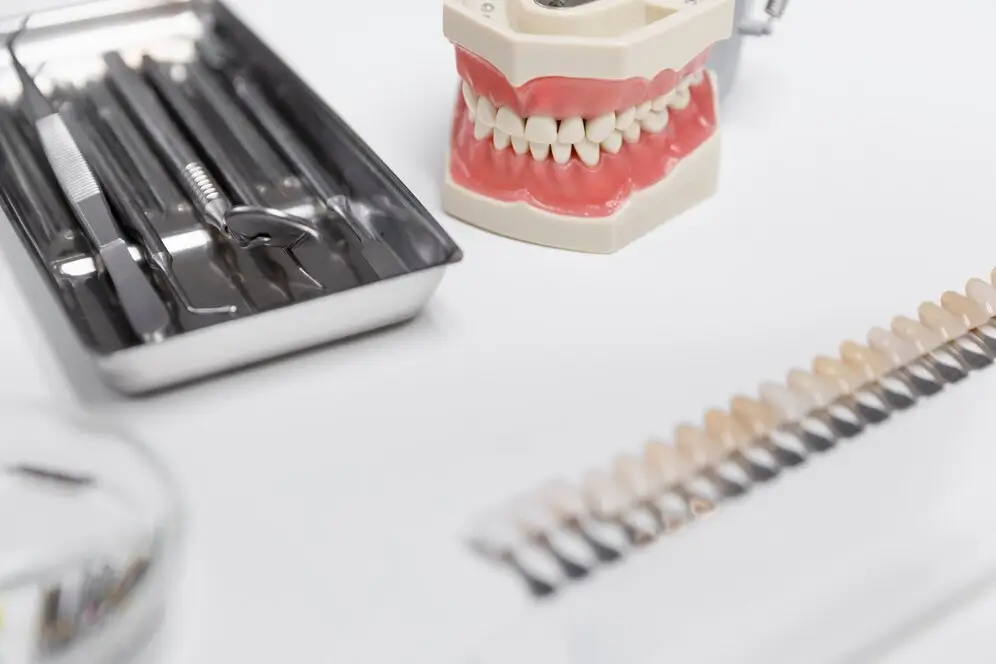
Types of Dentures
- Conventional Dentures. These are made after all teeth are removed and gums have fully healed, typically 8 to 12 weeks post-extraction.
- Immediate Dentures. Prepared in advance and placed right after tooth removal, these offer a temporary solution during healing but may need frequent adjustments.
- Overdentures. They fit over remaining natural teeth or implants, and add extra support and comfort compared to traditional full dentures.
- Implant-Supported Dentures. These dentures snap onto implants placed in the jaw, providing better stability, a more natural look, and improved function. Though more expensive, they’re a long-term and secure choice.
Types of Dental Implants
- Endosteal Implants. These are the most widely used implants, placed directly into the jawbone. After healing and bone fusion, a replacement tooth is attached.
- Subperiosteal Implants. Instead of going into the bone, these rest on top of the jawbone and beneath the gums. They’re ideal for patients without enough healthy bone for traditional implants.
- Mini Implants. Smaller in size, mini implants are often used to stabilize dentures. They require less bone structure and can typically be placed in just one visit.
Aftercare of Dentures vs. Implants
Caring for your dental work might seem complicated, but aftercare for both dentures and implants is simpler than many expect – and it makes a huge difference in how long they last. If you’re comparing dentures vs dental implants, follow these simple tips. Brush and floss daily, just like you would with natural teeth. Visit your dentist regularly to monitor fit and oral health. For dentures, use special cleaners instead of regular toothpaste and rinse them after eating. Avoid biting down on very hard or sticky foods, which can cause damage. Good habits go a long way.
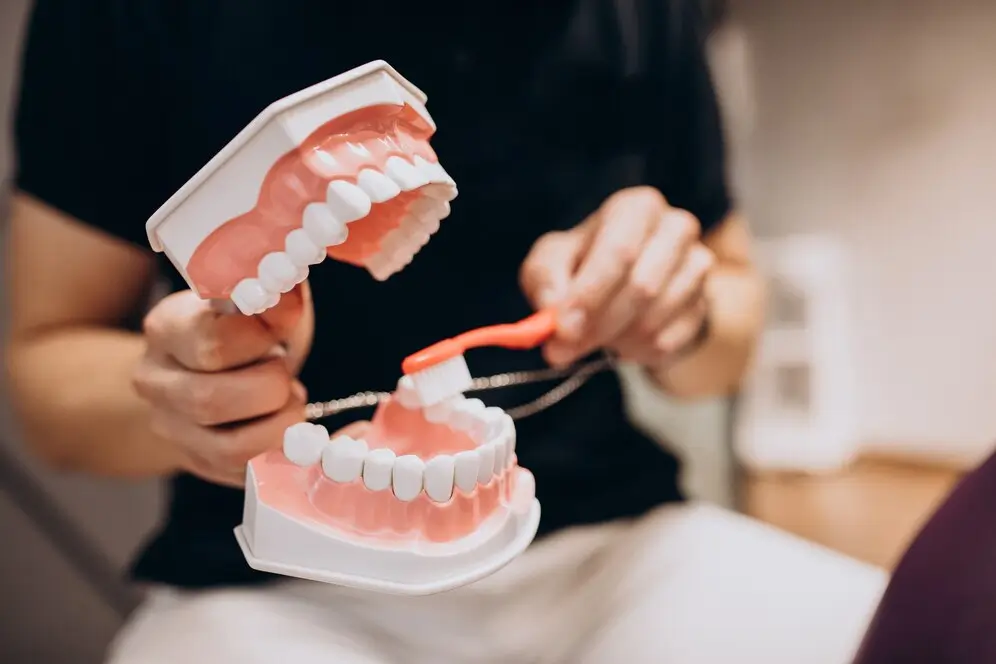
Alternatives to Implants and Dentures
If you’re not ready for full dental implants or traditional dentures, there are still practical options that can help you restore your smile. Dental bridges are one of the most common alternatives. They fill gaps left by missing teeth by anchoring artificial teeth to surrounding natural ones – no surgery required.
Fixed partial dentures are another choice. These offer the stability of a permanent solution without needing implants. For those who want a bit more security without the higher cost of full implants, snap-on or implant-retained dentures can be a compromise. They use fewer implants to provide better fit and support, with less invasiveness.
Dentures vs Implants: Pros & Cons
Dentures
Pros:
- More affordable upfront compared to implants
- No surgery required, making them a non-invasive option
- Easy to remove and clean
Cons:
- Can shift or feel loose, causing irritation or discomfort
- May rely on adhesives, which some find unpleasant or messy
- Need regular adjustments or replacements over time
Dental Implants
Pros:
- Look and function just like natural teeth
- Provide a long-term, stable solution to missing teeth
- Maintain bone health and don’t require removal for cleaning
Cons:
- Higher initial cost than dentures
- Surgical placement is required
- They are permanently fixed, making them not be suitable for everyone

How to Choose Between Dentures and Implants
- Consider Your Budget. When comparing tooth implants vs dentures, dentures usually cost less upfront, while implants cost more upfront but may save you money long-term.
- Think About Maintenance. With dental implants vs dentures, implants are brushed and flossed like real teeth, whereas dentures are removable and need special cleaning.
- Evaluate Longevity. Implants are built to last for decades and often feel permanent. Dentures, while effective, may need periodic adjustments or replacement.
- Factor in Stability. Dental implants are secured in the jaw, which is better for bite strength and preventing slippage – an important consideration in the dental implants vs dentures comparison.
- Health and Healing Time. Dentures are less invasive and can be fitted quickly. Implants require surgery and a long period of healing, but provide a more natural and lasting solution.
Dr. Doktorman Can Help You Choose Between Dentures and Implants
Dr. Edward Doktorman combines experience, precision, and genuine patient-focused care to help you choose the right solution for your smile – whether you’re deciding between teeth implants vs dentures or need professional advice on types of crowns and types of dental bridges.
With a modern, fully equipped office and a warm approach, Dr. Doktorman takes time to explain your options, personalize treatments, and answer other important questions – like how often should you go to the dentist or how long does teeth whitening last. Whether you’re looking for long-term results with implants or want to understand other options, his goal is to help you make the best choice for your health and comfort.
Schedule your consultation today and let Dr. Doktorman give you a beautiful smile you deserve!
Conclusion
When deciding between dentures and implants, it’s important to consider your budget, oral health, and goals. Both options can restore your smile, but their comfort, durability, and maintenance differ greatly. Understanding the pros and cons of each will help you make the best choice. Your dentist can also help you choose an option that will work the best for your needs and budget.
FAQs About Dentures vs. Implants
Are Implants More Comfortable than Dentures?
Dental implants are usually more comfortable than dentures because they are anchored directly into the jawbone. Unlike dentures, which can shift or cause irritation, implants function more like real teeth. When comparing dentures versus implants, many patients find implants easier to adjust to and more secure for daily use.
How Long Do Implants Last Compared to Dentures?
Dental implants can last 20 years or more with proper care, and often a lifetime, while dentures usually need to be replaced every 5 to 10 years because of wear or changes in gum shape. If you’re deciding between implants or dentures, implants offer a more durable and long-term solution, but they require a longer healing process and higher upfront cost.
Which Option Is Better for Bone Health: Implants or Dentures?
Dental implants are the better choice because they stimulate the jawbone, helping to prevent bone loss after tooth removal. Dentures, on the other hand, rest on the gums and don’t provide the same support, which can lead to gradual bone shrinkage. This makes a big difference in the comparison of dentures versus dental implants for long-term oral health.
Can I Switch from Dentures to Implants Later?
Many people start with dentures and later switch to implants if they’re looking for a more permanent option. However, your jawbone must be healthy enough to support implants, and bone grafting may be needed in case of significant bone loss. If you’re weighing an implant vs denture upgrade, your dentist can help you understand if this switch is right for you and your oral health.
What Is the Healing Time for Implants vs. Dentures?
The healing time for dental implants is about 3 to 6 months, as the implant needs to fuse with the jawbone. Dentures, on the other hand, can often be fitted within a few weeks after any necessary extractions.

